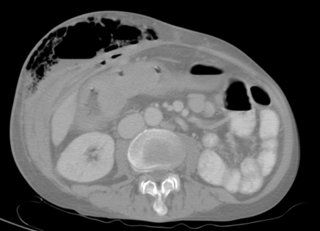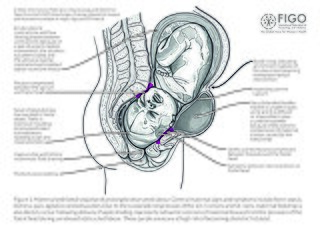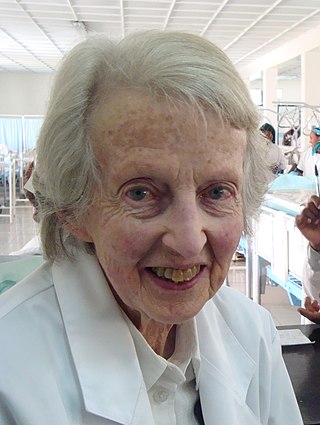Related Research Articles

In anatomy, a fistula is an abnormal connection joining two hollow spaces, such as blood vessels, intestines, or other hollow organs to each other, often resulting in an abnormal flow of fluid from one space to the other. An anal fistula connects the anal canal to the perianal skin. An anovaginal or rectovaginal fistula is a hole joining the anus or rectum to the vagina. A colovaginal fistula joins the space in the colon to that in the vagina. A urinary tract fistula is an abnormal opening in the urinary tract or an abnormal connection between the urinary tract and another organ. An abnormal communication between the bladder and the uterus is called a vesicouterine fistula, while if it is between the bladder and the vagina it is known as a vesicovaginal fistula, and if between the urethra and the vagina: a urethrovaginal fistula. When occurring between two parts of the intestine, it is known as an enteroenteral fistula, between the small intestine and the skin as an enterocutaneous fistula, and between the colon and the skin as a colocutaneous fistula.

Obstetric fistula is a medical condition in which a hole develops in the birth canal as a result of childbirth. This can be between the vagina and rectum, ureter, or bladder. It can result in incontinence of urine or feces. Complications may include depression, infertility, and social isolation.
Encompass Health Corporation, based in Birmingham, Alabama, is one of the United States' largest providers of post-acute healthcare services, offering both facility-based and home-based post-acute services in 36 states and Puerto Rico through its network of inpatient rehabilitation hospitals, home health agencies, and hospice agencies. Effective January 2, 2018, the organization changed its name to Encompass Health Corporation and its New York Stock Exchange (NYSE) ticker symbol from HLS to EHC.

Government Medical College, Kottayam is a government medical college in Kerala, India. The campus is about 8 km (5.0 mi) north of Kottayam in Gandhinagar-Arpookkara area in Central Kerala.

Elinor Catherine Hamlin, AC, FRCS, FRANZCOG, FRCOG was an Australian obstetrician and gynaecologist who, with her husband, New Zealander Reginald Hamlin, co-founded the Addis Ababa Fistula Hospital, the world's only medical centre dedicated exclusively to providing free obstetric fistula repair surgery to poor women with childbirth injuries. They also co-founded an associated non-profit organisation, Hamlin Fistula Ethiopia.
The Winnipeg Regional Health Authority is the governing body for healthcare regulation for the City of Winnipeg, the northern community of Churchill, and the Rural Municipalities of East and West St. Paul, in the Canadian province of Manitoba. The WRHA also provides health-care support and specialty referral services to those Manitobans who live out of these boundaries, as well as residents of northwestern Ontario and Nunavut.
Centene Corporation is a publicly traded managed care company based in St. Louis, Missouri, which is an intermediary for government-sponsored and privately insured healthcare programs. Centene ranked No. 25 on the 2023 Fortune 500.

Fistula Foundation is a nonprofit 501(c)(3) organization focused on treatment of obstetric fistula, funding more repair surgeries than any other organization, public or private. As of September 2022, they support hospitals and doctors in over 20 countries across Africa and Asia. The foundation is dedicated to treating obstetric fistula by covering the full cost of fistula repair surgery for poor women who would otherwise not be able to access treatment. They also provide fistula surgeon training, equipment and facility upgrades that make fistula treatment as safe as possible, post-surgery counseling and support for healed patients. The foundation has been recognized by several organizations for its transparency, effectiveness and efficiency, earning a top "A" rating from CharityWatch and a four star rating from Charity Navigator for 16 years in a row, placing it in the top 1% of charities reviewed on the site. In 2023, the foundation received a $15 million gift from philanthropist MacKenzie Scott, announced alongside a new five-year strategic plan that will advance the foundation's In It to End It vision. The foundation has also been selected as one of 22 charities recommended by Princeton Professor Peter Singer's organization, The Life You Can Save. The organization's cost-effectiveness was also noted by GiveWell in 2019.
CURE International, based in Grand Rapids, MI, is a Christian nonprofit organization that owns and operates eight charitable children's hospitals around the world. CURE provides medical care to pediatric patients with orthopedic, reconstructive plastic, and neurological conditions. The organization's stated mission is to "heal the sick and proclaim the kingdom of God." The organization currently operates hospitals in Ethiopia, Kenya, Malawi, Niger, the Philippines, Uganda, Zambia and Zimbabwe.
ChristianaCare is a network of private, non-profit hospitals providing health care services to all of the U.S. state of Delaware and portions of seven counties bordering the state in Pennsylvania, Maryland and New Jersey. The system includes two hospitals in Delaware, Wilmington Hospital and Christiana Hospital, and one in Maryland, ChristianaCare Union Hospital in Elkton. ChristianaCare operates the Helen F. Graham Cancer Center & Research Institute, the Center for Heart & Vascular Health, The Center for Women & Children's Health, and ChristianaCare HomeHealth, as well as the Eugene du Pont Preventive Medicine & Rehabilitation Center, and a wide range of outpatient and satellite services. ChristianaCare is headquartered in Wilmington, Delaware.

The Philippine Health Insurance Corporation (PhilHealth) was created in 1995 to implement universal health coverage in the Philippines. It is a tax-exempt, government-owned and controlled corporation (GOCC) of the Philippines, and is attached to the Department of Health. On August 4, 1969, Republic Act 6111 or the Philippine Medical Care Act of 1969 was signed by President Ferdinand E. Marcos which was eventually implemented in August 1971.

Clatterbridge Health Park is a campus of otherwise independent, health care-related organisations, including three separate NHS trusts.
The Children's Surgical Centre (CSC) is a non-profit, non-governmental, and non-religious surgical hospital in Phnom Penh, Cambodia and registered as a 501(c)(3) in the United States. Founded in 1998, the centre aims to improve the quality of life for disabled children and adults by providing free rehabilitative surgery.
Nakasero Hospital Limited, commonly referred to as Nakasero Hospital, is a private, for-profit hospital in Kampala, the capital of Uganda and the largest city in that country. The hospital is one of five private upscale hospitals in the city; the others being International Hospital Kampala in Namuwongo, Paragon Hospital in Bugoloobi, Case Medical Centre in Kampala Central Division and Kampala Hospital in Kololo.

Auckland District Health Board (ADHB) was a district health board that provided healthcare in the Auckland Region in New Zealand, mainly on the Auckland isthmus. This district health board existed between 2001 and 2022 and was governed by a part-elected, part-appointed board. In 2022, its functions and responsibilities were subsumed by Te Whatu Ora and Te Aka Whai Ora.
Kate Grant is an American nonprofit leader. She is the founding CEO of Fistula Foundation, a global nonprofit organization that provides surgical treatment for the childbirth injury obstetric fistula. She has led the organization from supporting one hospital in Ethiopia to being the clear global leader in obstetric fistula treatment. Fistula Foundation funds more fistula surgeries than any organization in the world; their goal is to eliminate the suffering caused by the injury, which untreated leaves women incontinent and too frequently social outcasts. An estimated one million women suffer from fistula worldwide, and due to a global shortage in awareness and funding, fewer than 20,000 are treated each year. Under Ms. Grant's leadership, Fistula Foundation has raised more than $140 million and supported treatment in 34 countries. Fistula Foundation is a recommended charity of ethicist Peter Singer's The Life You Can Save. In addition, it has earned a 4-star rating from Charity Navigator every year since 2005, and an A rating from Charity Watch. In 2023, the foundation received its largest-ever gift—a $15 million donation from philanthropist MacKenzie Scott.
A urogenital fistula is an abnormal tract that exists between the urinary tract and bladder, ureters, or urethra. A urogenital fistula can occur between any of the organs and structures of the pelvic region. A fistula allows urine to continually exit through and out the urogenital tract. This can result in significant disability, interference with sexual activity, and other physical health issues, the effects of which may in turn have a negative impact on mental or emotional state, including an increase in social isolation. Urogenital fistulas vary in etiology. Fistulas are usually caused by injury or surgery, but they can also result from malignancy, infection, prolonged and obstructed labor and deliver in childbirth, hysterectomy, radiation therapy or inflammation. Of the fistulas that develop from difficult childbirth, 97 percent occur in developing countries. Congenital urogenital fistulas are rare; only ten cases have been documented. Abnormal passageways can also exist between the vagina and the organs of the gastrointestinal system, and these may also be termed fistulas.
The Association for Rehabilitation and Re-Orientation of Women for Development, abbreviated as TERREWODE, is a leading Ugandan nonprofit organization. It pioneered best practices for the elimination of obstetric fistula in Uganda over 16 years. The organization focuses on maternal and reproductive health. Headquartered in Soroti, TERREWODE's efforts target the empowerment and education of young women in rural communities. TERREWODE's activism focuses on women's rights to maternal, reproductive and sexual health, as well as the treatment and social reintegration of victims of obstetric fistula.

Brenda Msangi is a Chief Executive Officer at Comprehensive Community Based Rehabilitation Tanzania (CCBRT) based in Dar es Salaam, Tanzania.She is also a healthcare leader, sustainable development advocate, and a businesswoman. She is known for her extensive work in the healthcare sector and her efforts to empower vulnerable communities in Tanzania.
South Korea's Deaf population began to come to prominence in recorded history in the late 19th century with the implementation of special education. Since then, they have gained government recognition and legal rights.
References
- ↑ Ending obstetric fistula: Devastating and preventable childbirth injury continues to haunt women, UNFPA, 21 May 2019.
- ↑ End ‘shame, isolation and segregation’ of fistula sufferers, urges UN reproductive health chief, United Nations, 23 May 2019.
- 1 2 'Domestic investment into health systems and services is crucial', The Guardian, 23 March 2019.
- ↑ 50 people living with disability on CCBRT database get jobs, The Citizen, 18 September 2019.
- ↑ Tanzanian woman becomes new head of CCBRT, IPP Media, 19 December 2018.